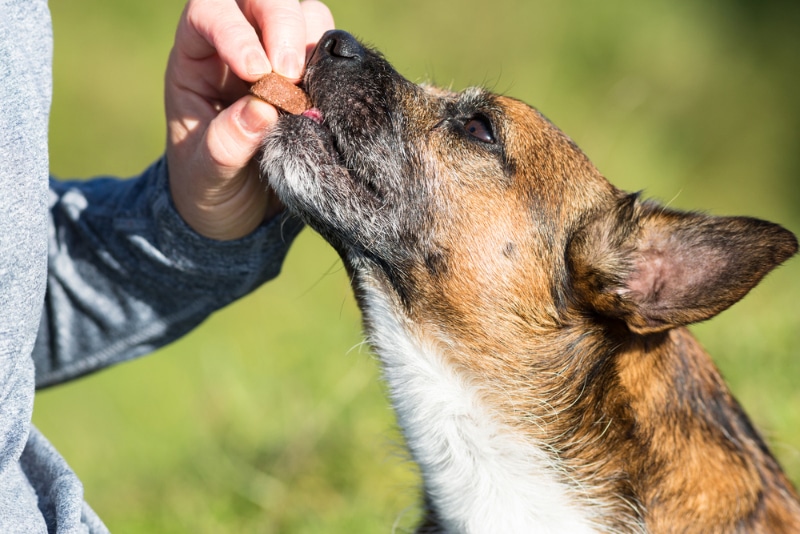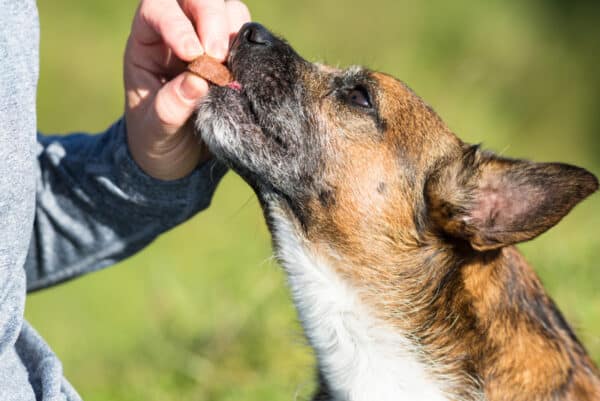Click to Skip Ahead
Heartgard is a popular heartworm and intestinal parasite prevention used in dogs. It’s been around for a long time, and many know of the medication to be safe and trusted. One of the best things about Heartgard can also be a problem – it’s delicious taste. Even the pickiest of dogs tend to love the flavor of Heartgard because it contains real beef. But that also means many dogs may get into the box and eat them all, making them susceptible to possible toxicity due to overdose. In this article, we’ll discuss what Heartgard is, its’ active ingredients, if your dog can overdose on it, and what you may notice if this happens.

What Is in Heartgard?
As mentioned above, Heartgard is a heartworm and intestinal parasite preventative. The active ingredients are ivermectin and pyrantel pamoate. Ivermectin and pyrantel are both considered anthelmintics. In other words, they are both types of dewormers.
The ivermectin can kill heartworm larvae, stopping the heartworms from being able to develop into adults. It’s important to understand that Heartgard is not a treatment for adult heartworms! It is meant to be given as a preventative, so that adult heartworms do not develop.
The pyrantel in Heartgard is used to help the prevention and treatment of roundworms, hookworms, and some stomach worms.
Can Dogs Overdose on Heartgard?
Heartgard is safe in appropriate doses. An appropriate dose is based on your dog’s body weight, in addition to taking their breed into account. That’s because there are some breeds (often Collies and related breeds) that may have a gene mutation making them more sensitive to the class of drugs that ivermectin is in. This means that even a small overdose, in those dogs with the mutation, may cause a severe toxic effect. Unfortunately, many people don’t know if their dog has this gene mutation, so it’s always recommended to work with your veterinarian on the best medication options if you own a Collie type breed.
According to the package insert, “Heartgard demonstrated no signs of toxicity at 10 times the recommended dose in sensitive Collies”. Studies did show that some dogs of the Collie breed were sensitive to signs of toxicity at doses 16 times higher than the target level. For dogs that do not have a gene mutation and/or are not of any Collie breed line, they have even less risk of developing any sensitivities and/or reactions aside from severe toxicity cases. In other words, if your dog eats multiple boxes of Heartgard, then they may be at risk for overdosing and developing signs of toxicity.
The pyrantel pamoate in Heartgard is even safer, with animals having to ingest extremely high doses to show any signs of toxicity. It’s generally believed that if a dog accidentally ingested or was accidentally given the wrong dose of Heartgard and they develop any signs of toxicity, that it’s likely from the ivermectin versus the pyrantel.
What Are Signs of an Overdose?
An overdose can occur in any breed and any size dog. However, we do see more toxic side effects and/or more severe overdoses in dogs with the gene mutation. We can see overdoses in dogs that get into the entire stash of Heartgard, a dog that was accidentally given or gets into a larger size of the medication, or dogs that get into the supply of ivermectin horse dewormer. Ivermectin toxicity will cause dilated pupils, tremors, seizures, drooling, trouble walking (ataxia), and blindness. If untreated, these signs can quickly progress to coma and death.
Treatment for an overdose should be aggressive and should involve a veterinarian. Animals have to be hospitalized and treated aggressively before they progress to being comatose, blind, etc. Survival rates depend on how much was ingested, how long until treatment is started, and if the pet is a sensitive Collie-type breed. There are no effective at-home treatments for an overdose that we can recommend.

What’s Worse: The Risk of Heartworm or the Risk of Toxicity?
The risk of heartworm far outweighs the risk of giving Heartgard. Heartworm is spread by mosquitoes, and can be found across the country. The risk and prevalence of heartworm disease is much higher in those states that are warmer, more humid, and therefore have more mosquitos – i.e., the more southern states.
Heartworm can be deadly even if treated. While there are effective treatments available nowadays for heartworm positive dogs, there are risks and it is not absolutely guaranteed there won’t be side effects. Not to mention that the cost of treatment can be difficult to manage for many people. The cost of a monthly preventative such as Heartgard is much less expensive. Taking the very low risk that your dog will have an ivermectin reaction is a much better roll of the dice than never giving prevention and hoping your dog does not develop heartworms.

Conclusion
In general, Heartgard is a very safe and effective monthly preventive used for heartworm disease and some intestinal parasites. The main ingredients are ivermectin and pyrantel, both being safe medications for consumption by your dog. Both drugs are considered anthelmintics, or types of dewormers. Both active ingredients are, in general, considered very safe. Massive doses have to be consumed in order for your dog to suffer and overdose and show signs of toxicity. Some Collie breed dogs do have a gene mutation that may make them more sensitive to the class of drugs that ivermectin is in. Always work with your veterinarian about the best preventative options for your dog depending on their age, breed, and where you live.
Featured Image Credit: Rob kemp, Shutterstock











